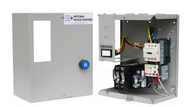Electric motors play a crucial role in various industrial and commercial applications, powering everything from HVAC systems to conveyor belts. To ensure these motors operate efficiently and safely, a reliable motor starter is essential. One of the most effective and widely used options is the magnetic motor starter. In this guide, we’ll explore what magnetic motor starters are, how they work, and how they compare to other types of motor starters.
What Is a Magnetic Motor Starter?
A magnetic motor starter is an electromechanical switch designed to start and stop electric motors automatically. It handles high-voltage motors while providing critical safety features like overload protection.
Key components of a magnetic motor starter include:
-
Contactor – A switch that opens or closes the electrical circuit to power the motor.
-
Overload Protection – Prevents motor damage by shutting down the system in case of excessive current or overheating.
-
Control Circuit – Automates motor operation, reducing the need for manual control.
When an electric signal activates the contactor, it closes the circuit, allowing power to flow to the motor. When the signal stops, the contactor opens, cutting off power. This automation ensures smooth operation while protecting the motor from potential electrical issues.
How Does a Magnetic Motor Starter Work?
Magnetic motor starters use electromagnetic coils to regulate electricity flow to a motor. Here’s how they function:
-
Control Circuit Activation: Pressing the "start" button or sending a control signal energizes the electromagnetic coil.
-
Contactor Closure: The energized coil creates a magnetic field, pulling the contactor's contacts together to close the circuit.
-
Motor Operation: With the circuit closed, power flows to the motor, keeping it running while the starter monitors the current.
-
Overload Protection (if needed): If excessive current is detected, the starter trips, opening the circuit and shutting off the motor to prevent damage.
-
Stopping the Motor: Pressing the "stop" button deactivates the coil, causing the contactor to open and stopping the motor.
This automated process ensures magnetic starters provide a reliable and safe way to control electric motors.
Why Are Magnetic Motor Starters Essential?
Several advantages make magnetic motor starters a critical component in motor control systems:
-
Enhanced Safety – Protects motors from overheating, power surges, and electrical faults.
-
Efficient Motor Control – Enables automated starts and stops, reducing the need for manual intervention.
-
Durability and Longevity – Designed to withstand high-voltage operations in demanding environments, making them a cost-effective solution.
Types of Motor Starters: How Do Magnetic Starters Compare?
Different motor starters offer varying levels of automation and protection. Here’s how magnetic motor starters stack up against other options:
-
Magnetic Motor Starters – Use electromagnetic fields for automatic control and provide built-in safety features, making them ideal for industrial applications.
-
Manual Motor Starters – Require a physical switch to operate but lack automatic overload protection.
-
Combination Starters – Integrate a magnetic starter with a disconnect switch for improved safety and efficiency.
-
Solid-State Motor Starters – Use electronic components for precise motor control, enabling smooth acceleration and energy efficiency.
-
Star-Delta Starters – Reduce inrush current when starting large motors, improving energy efficiency and minimizing electrical surges.
How to Choose the Right Motor Starter
Selecting the best motor starter depends on factors such as motor size, voltage, and environmental conditions. Key considerations include:
-
Motor Size: Large motors benefit from advanced starters like star-delta or solid-state starters, while smaller motors can efficiently use magnetic motor starters.
-
Voltage Requirements: Ensure your motor starter matches the required voltage. Magnetic motor starters are particularly effective in high-voltage applications.
-
Operating Environment: For motors exposed to extreme temperatures, dust, or moisture, magnetic starters provide reliable performance.
A magnetic motor starter is essential for ensuring the safe and efficient operation of electric motors. Whether you're managing a small facility or a large industrial operation, understanding different types of motor starters helps you choose the right solution. To learn more about high-quality magnetic starters, visit National Motor Starters today!

